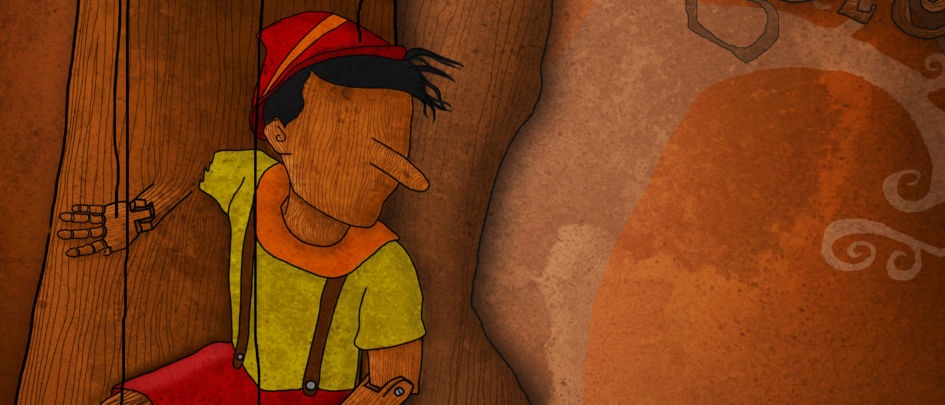Liverpool-based theatre company Cuckootales took the brave decision to produce their version of the tale of Pinocchio. I say ‘brave’ because despite the seeming simplicity of the tale – woodcutter carves puppet out of magic tree, puppet is naughty but fairy helps him learn to be good, and when he has learned, he becomes a real boy – the tale has a complex structure, and Pinocchio’s character is not quite as likeable in the original story as he is in the Disney version.
There are also difficult issues to tackle; Pinocchio’s most famous trait is how his nose grows when he tells lies, but lying is the least of his troubles. He laughs at his father, he is easily led astray, and he becomes violent when crossed, throwing a book at, and thus killing, the talking cricket (who becomes his conscience). Indeed, as in most unsanitised fairy tales, the gruesome, the frightening, and the brutal abound.
Cuckootales tackle several of these issues head on. They don’t shirk from the difficulties inherent in the story and have resisted the temptation to oversimplify it for their audience, and for this, they should be applauded. However, it does mean that younger members of the audience (I took my 4-year old niece) might find the tale difficult to follow without some guidance or without having been made familiar with the story beforehand. A narrator or a programme might have helped here. And some of the elements (such as the marionettes being tortured) might also require some careful discussion.
That aside, though, the production as a whole is enchanting. The cast (a cast list was not available, so apologies for identifying individuals only by character) were excellent; Pinocchio manages to convey naughtiness without alienating the audience and making his redemption believable; Gepetto is as kindly and considerate a father as anyone could hope for; and it is easy to believe that the charismatic Candlewick could lead his young friend astray). Stromboli was suitably dangerous, and Cat and Fox were plausible, though the use of different accents to show the difference between their real selves and the pretence they put on for Pinocchio again might be confusing for some of the younger members of the audience. Similarly, some of the jokes (especially the linguistic ones told mainly by the dogs hunting the miscreants) would be over the head of younger theatregoers, but were very much appreciated by the older members.
Costumes, special effects, and set are first-rate throughout. The fairy gets the best dress, as is only right – her guiding presence is not just for Pinocchio’s benefit but also to underline the key elements of the tale – be kind, look after people, work hard, not everything is what it seems, and tell the truth. There are some excellent songs and some beautiful singing. A shout out also to the youngest members of the cast (from the Helen O’Grady drama academy) as the woodland sprites and the fairy’s bluebirds.
Overall, there is a great deal to enjoy and admire and, very importantly, the ambiguities and challenges will give opportunities for discussion regarding Pinocchio’s choices and his journey to learning to have a good heart, so the experience will live on in the children’s memories and encourage them to view the theatre as an interactive and challenging experience rather than a passive and facile one.
Reviewer: Johanna Roberts
Reviewed: 23rd July 2018
North West End Rating: ★★★★

